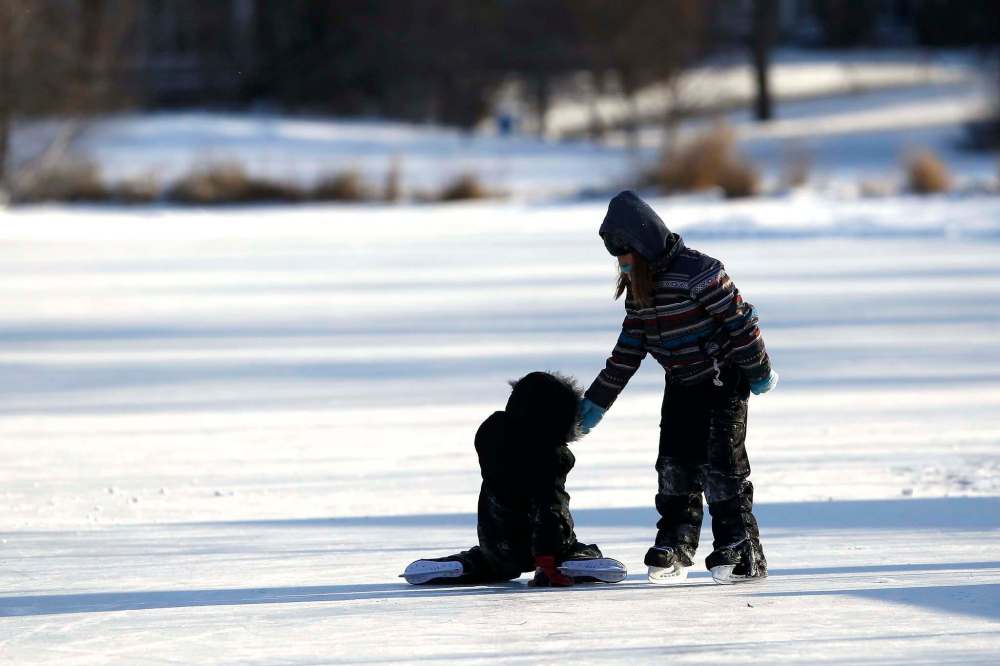Manitoba winters getting shorter, study finds
Advertisement
Read this article for free:
or
Already have an account? Log in here »
To continue reading, please subscribe:
Monthly Digital Subscription
$0 for the first 4 weeks*
- Enjoy unlimited reading on winnipegfreepress.com
- Read the E-Edition, our digital replica newspaper
- Access News Break, our award-winning app
- Play interactive puzzles
*No charge for 4 weeks then price increases to the regular rate of $19.00 plus GST every four weeks. Offer available to new and qualified returning subscribers only. Cancel any time.
Monthly Digital Subscription
$4.75/week*
- Enjoy unlimited reading on winnipegfreepress.com
- Read the E-Edition, our digital replica newspaper
- Access News Break, our award-winning app
- Play interactive puzzles
*Billed as $19 plus GST every four weeks. Cancel any time.
To continue reading, please subscribe:
Add Free Press access to your Brandon Sun subscription for only an additional
$1 for the first 4 weeks*
*Your next subscription payment will increase by $1.00 and you will be charged $16.99 plus GST for four weeks. After four weeks, your payment will increase to $23.99 plus GST every four weeks.
Read unlimited articles for free today:
or
Already have an account? Log in here »
Hey there, time traveller!
This article was published 16/12/2019 (2185 days ago), so information in it may no longer be current.
Not only are Manitoba’s winters shorter, but the province gets less snow than it did a century ago.
A new scientific report, which issues a warning about the effects of human-caused climate change, has found that Manitoba’s winters are almost two weeks shorter than 100 years ago.
The results of a three-year analysis of 100 years of winter temperature and precipitation data from weather stations in forested areas around and north of the Great Lakes region, including eastern Manitoba, were published last week.

Researchers from across the continent — among them, a co-director of the Prairie Climate Centre — found a clear pattern: there were fewer days with below 0 C temperatures and the snowpack declined in the northeastern United States and Canada from 1917 to 2016.
The findings were published by the New Hampshire-based Hubbard Brook Research Foundation, a non-profit that supports the Hubbard Brook Ecosystem Study.
“The subject of winter climate change is a tough one because people are like ‘Oh, shorter winters? That’s great! I hate it when it’s cold,’” said Nora Casson, an associate professor of geography at the University of Winnipeg, who co-authored Confronting Our Changing Winters.
“Even though people may not think they like the winter, this cold and snow is really important.”
Data show the length of winter, as defined by the number of days between the onset and end of a sustained cold period, is down an average of two weeks in the upper midwest region of the U.S. and southern Prairie region of Canada since 1917.
Two Manitoba weather stations, in Indian Bay and Pinawa, were examined to determine how winters have changed. Between 1917 and 2016, each Manitoba site lost about 12 days below 0 C, in total.
“Extreme cold days” — the average number of days cooler than – 30 C — also shrunk over that time; Indian Bay lost about 21 days and Pinawa lost 16.
Days when the regions are covered in a white blanket haven’t been exempt from change either. Indian Bay and Pinawa both have fewer snow-covered days, 18 and 13 fewer, respectively.
The change “has profound implications for water, wildlife, forests, and people,” the report states.

“One of the most common reactions I get from people is, ‘Isn’t this normal?’” said Curt Hull with Climate Change Connection of Winnipeg. “A study like this shows that it’s not normal.”
He noted that while the planet has entered warming and ice age periods throughout history, humanity entered the Industrial Revolution during a warming period and Earth’s temperature has risen at a rapid pace since then.
Scientists worldwide have called on countries to ensure the global temperature doesn’t rise 1.5 C above pre-industrial levels in order to avoid catastrophic climate change.
“One of the reasons for doing this kind of work is to identify ways that people and communities can adapt and change in their response to different, changing winter conditions,” Casson said.
The report notes that everything from outdoor recreation to flooding, wildlife to public health is affected by warmer winters in the region.
Casson cited the importance of snow cover, which insulates soil and protects tree roots from freezing in forests, and the value of freezing temperatures keeping populations of ticks and mosquitoes down.
Entomologist Taz Stuart said rising temperatures allow invasive mosquitoes to infiltrate new regions. Extended spring and summer seasons mean certain species can thrive longer, he said.
Hull said he worries most about the effect warming winters will have on the ability to transport essential goods to remote Manitoba communities.

“There’s going to be a year in the not-to-distant future where there won’t be a winter road,” he said.
As for recreation, Shannon Johnston, assistant manager at the Asessippi ski resort north of Russell, said warmer winters have prompted the resort to make upgrades to maintain its months-long ski season.
“We’ve spent a lot of time and money on infrastructure to upgrade our snow system so we can make snow at warmer temperatures,” Johnston said.
maggie.macintosh@freepress.mb.ca
Twitter: @macintoshmaggie

Maggie Macintosh reports on education for the Winnipeg Free Press. Funding for the Free Press education reporter comes from the Government of Canada through the Local Journalism Initiative.
Our newsroom depends on a growing audience of readers to power our journalism. If you are not a paid reader, please consider becoming a subscriber.
Our newsroom depends on its audience of readers to power our journalism. Thank you for your support.



